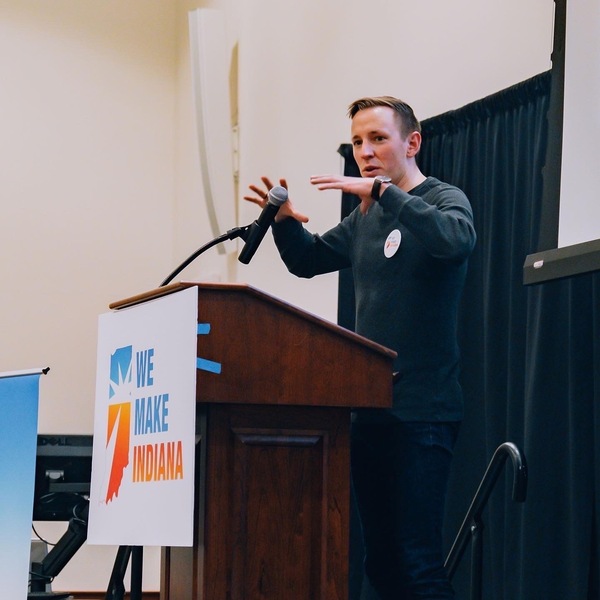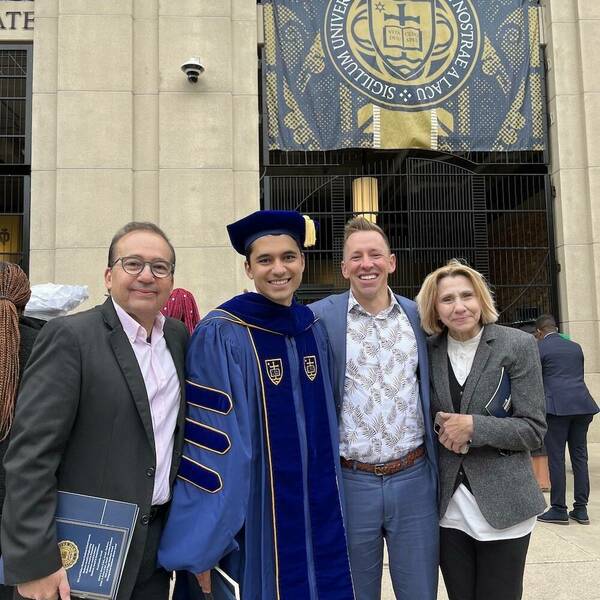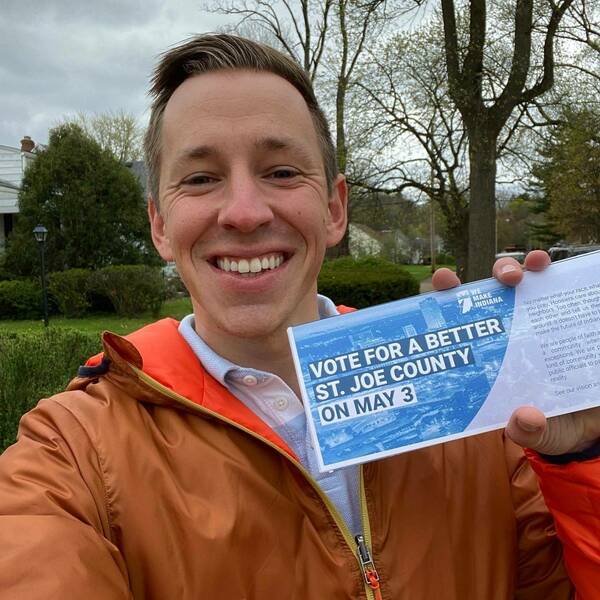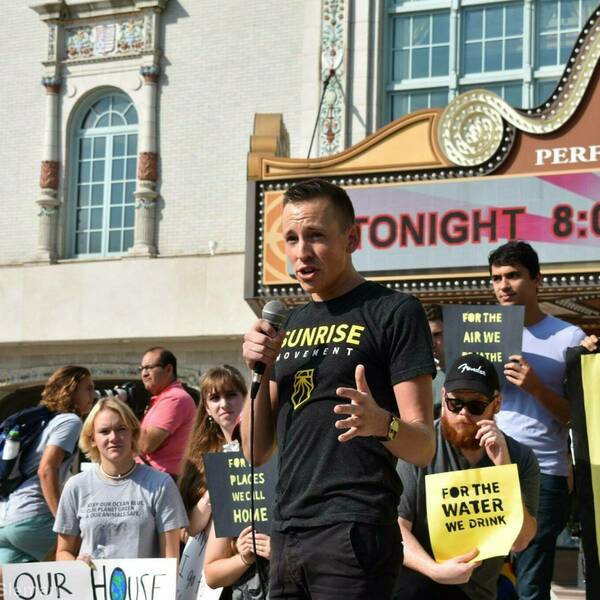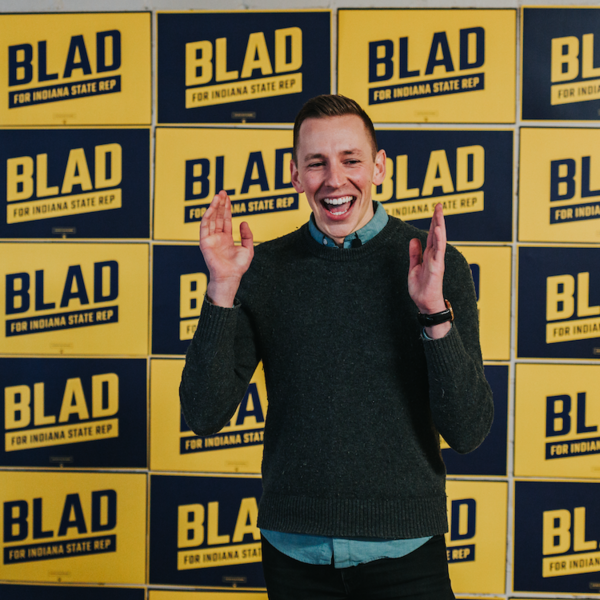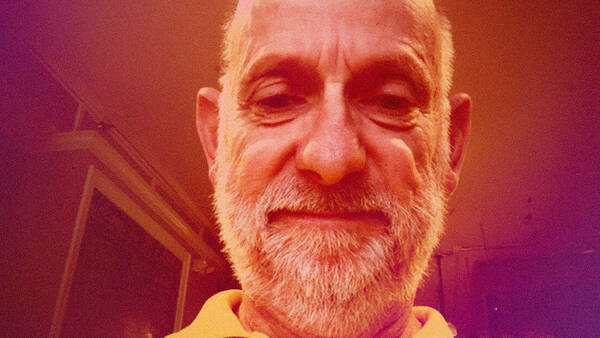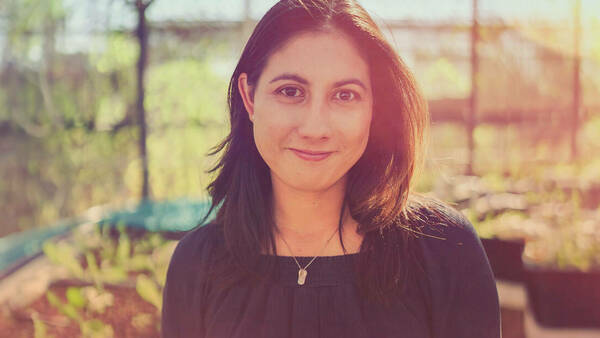When talking about climate change, Garrett Blad ’15 doesn’t speak in statistics about ocean temperatures or percentage of carbon in the atmosphere. He speaks in stories.
“We only care about floods and fires and storms getting worse because they destroy the things that we love,” Blad says.
The Indiana native first began thinking about climate change through a human lens in his ecology seminar at Notre Dame.
“I was sitting in Debart 101 in the big seminar class reading about how the climate of current-day Texas would be what we experience in Indiana in my lifetime,” Blad says. “I grew up in this area on my family farm here. I remember just feeling dread in my stomach about what that would mean, knowing very clearly from seeing my family farm how important it is to have regular patterns of rainfall and temperature ranges. And if that all shifts, what does this place look like? I couldn’t fathom it. So I decided to learn everything I could about it.”
Blad self-designed a major in environmental science and sustainable policy, allowing him to take an interdisciplinary approach to examining climate change. As his passion for the issue grew, Blad could not ignore a telltale signal of the crisis on his own campus.
“What stood out to me at Notre Dame was – what is that plume of smoke behind the lakes? I learned about what at the time was a coal plant. I learned that coal causes asthma in kids, gives people other respiratory illnesses, and is warming our planet.”
Blad began holding meetings in South Dining Hall with faculty, staff, and other students to discuss the issue. Eventually, Blad and fellow student Katie Otterbeck ’15, founded Fossil Free ND (formerly We Are 9), a campaign that urged the university to stop burning coal and to divest from fossil fuels. After canvassing door-to-door to collect petition signatures, Blad and his team secured a meeting with Father Jenkins. The following year, Notre Dame made a commitment to phasing out coal at the university.
“I felt for the first time when we won that campaign that I could be a powerful person in the world, that I didn’t just have to be a bystander watching bad things happen to my community. So that kind of launched me into this work.”
After graduation, Blad took his activism a step further by launching a new project called Climate Journey. From June to December of 2015, Blad and another young activist, Morgan Curtis, biked through 11 countries in North America and Europe to reach the United Nations’ COP21 Climate Talks in Paris, amplifying stories from the climate movement on their way.
“We followed people in Manchester, England, who were building solar cooperatives across cities. We found grandparents in Norway who were campaigning to get 100% clean energy in their cities,” Blad recalls. “The purpose was to follow the lights of hope in a dark time that would guide us towards a solution and what people can do to join the movement.”
Once they reached Paris, Blad joined the COP21 climate talks as a Youth Delegate with the advocacy group SustainUS. As Blad connected with the other youth delegates, he felt his optimism for the future falter.
“I remember this kid AJ, a young person from the Maldives, talking about how he has had to move the bones of his grandfather three times because of sea level rise. And he came up to me and said, ‘What are you going to do about it? Your country is a huge part of the problem.’ And I mean this happened the entire two weeks, us being inundated by young people from all over the world asking – ‘what is your country going do about it?’”
Feeling disheartened, Blad took some time away from the movement. A year later, he was living in New York when the leader of his Paris delegation, Diana Jay, reached out about a new climate advocacy project. Blad found himself at a crossroads.
“I just had this moment, like, what am I called on this earth to do? And it was very clear for me that it was not to stay in New York and continue to climb in the rat race. I wanted to go back and start building something that could change my home.”
Blad moved back to Indiana and joined what would eventually become the Sunrise Movement, an organization advocating for political action on climate change. Blad spoke at high schools and churches about their cause, working to build chapters throughout the Midwest. The Sunrise Movement rose to national attention in 2018 when they occupied Nancy Pelosi’s office to push her to support a Green New Deal.
“I think what my experience with Sunrise and with the youth movement taught me was that we can build and develop these ideas ourselves and build the public support we need to pass them,” Blad says. “One thing that young people bring is that fierce clarity of vision and urgency.”
In 2020, Blad used his experience in grassroots organizing to launch a campaign for the Indiana House of Representatives. Without the financial resources or institutional support of his competitor, Blad relied on the basics to connect with voters – he listened to their stories.
“When I get on the phone with folks and I say I’m running for office, people tell me what’s real in their life. There’s no small talk. I heard stories about people who were getting kicked off their healthcare because of these $1 payments that are required to be on the public healthcare in Indiana that got missed. I would talk to people who had to make choices about where to send their kids because our school systems have been so underfunded that they feel that they have to go to private schools. I learned that there is deep pain in our city.”
Despite losing the election by only 300 votes, Blad emerged from the campaign feeling energized about continuing to fight for change. He now serves as the civic engagement director for Faith in Indiana, a multi-faith, multi-racial organization committed to building racial and economic equity within the state.
Blad even shared his own story in order to help advance the group’s recent effort to expand mental health services and fund clinician-forward crisis response centers in Indiana. Blad’s brother, Austin, had long struggled with undiagnosed mental illness, but when he was hospitalized in 2022, the hospital did not conduct a mental health assessment as Blad and his family asked. Blad believes if they had done the assessment, which would have allowed his family to take on a larger role in his brother’s care, the doctors might have been able to catch the infection that ultimately took Austin’s life shortly after. When Blad testified to state officials on the needless loss of his brother, he was met with more support than he could’ve imagined.
“I had state reps who I never thought would align with anything I cared about crying and hugging me in the hallway after. I felt relieved that this wasn’t a problem I had to handle by myself. That we could figure out something better together and that people like my brother could get care when they deserve it in the future.”
Throughout all his work, Blad has remembered the teachings of Marshall Ganz, a Harvard lecturer and political organizer, on the importance of storytelling.
“He was really interested in how we share stories that communicate the people and places that we love and what we want to save, protect and fight for, that could help remind us what is beautiful about this world. I’m more interested in what I want to build and what’s possible than what we’re going to lose.”


